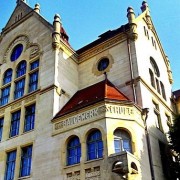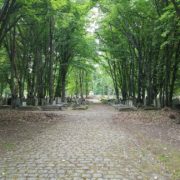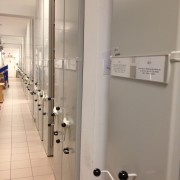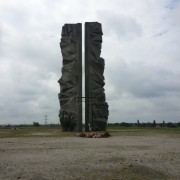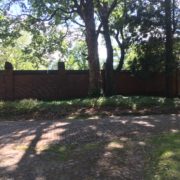Preserving a Forgotten Past
By Stella Van Ness
The city of Wroclaw, Poland has a lengthy and complicated history. Part of its history includes a time when it was the German city of Breslau. After the Germans lost WWII the Polish border was shifted west into German territory, and the city began a new chapter in its Polish heritage. After six years of brutal occupation, during which Poland lost about six million of it’s citizens, or 17% of it’s population[i], settlers in the newly acquired Polish city tried to erase its German past. This was done through many different means. One of the common ways to rid the city of its German origins was to destroy its cemeteries. As part of our study abroad program here in Wroclaw we attended to one of these destroyed and forgotten cemeteries. The cemetery we are working in is called The New Jewish Cemetery on Lotnicza Street, and was founded in 1902. The New Jewish Cemetery contains mostly the graves of German Jews. The cemetery also contains memorials as a tribute to the Jews who lost their lives during the Holocaust. Despite the battles of WWII, which destroyed much of the city, it is important to understand that destruction of the New Jewish Cemetery began after WWII as part of the long process of cleansing the city of its German heritage.
The main goal of our work is tied to preserving the memory of those who are buried in the New Jewish Cemetery. Our service project involves creating a map of our assigned fields with the locations of individual graves, and putting together a corresponding document with the personal information that could be found on the gravestones. This information includes the names of people along with their dates of birth and death. I was shocked to see how little preservation there was in the New Jewish Cemetery. In the field I was working in, the majority of the plots contained no indication of who was burried there. Many spots contained either only the base of a headstone, or nothing at all. These conditions made mapping out the field very difficult because we had to guess where a grave might be located based on the graves we could see. Often times headsontes lay broken on the ground indicating that they had been knocked over by vandals, some who were perhaps trying to erase the German-Jewish past.
This lack of preservation and destruction truly shocked me. The effort and anger required to knock over a headstone is extensive. Other members of this program who were working in separate fields told me about hateful graffiti found in the areas of the cemetery they were working in. I always believed that it was a universal understanding that the dead were to be respected, and to see such disrespect has caused me to rethink how people may react in certain situations. It is hard for me to visualize the amount of hatred and anger needed to disgrace those who have passed on. Seeing the destruction made me glad that we were there to preserve what we could.
The work being done in The New Jewish Cemetery was started before we arrived in Poland by a man named Piotr Gotowicki. Piotr has done work repairing cemeteries in the past. He is determined to preserve the city’s history. I find Piotr’s dedication to his work to be quite inspiring. While working he always seem to have a positive attitude, and clearly has a passion for what he is doing. I think seeing his passion has allowed me to have a more enjoyable time while working in the cemetery. Coming in to this program I thought working in a cemetery would be drab and depressing. But seeing how happy Piotr is to be there every day helped me to understand that this work is meaningful, and there is no reason to be desolate. You have to focus on the positive aspects of this work; we are helping families keep the memories of their loved ones alive. It comforts me to know that the work I have done will have been of service to a good man like Piotr.
For me, this service aspect of the trip was very compelling. I chose this program specifically because it was not, for lack of a better word, touristy. With this service program I am able to complete meaningful work while I’m here, rather than just sightseeing. Through this work I am able to leave behind a footprint of my time here. I am able to remember thoes who otherwise might have been forgotten.
[i] Zubrzycki, Genevieve. The Politics of Jewish Absence in Contemporary Poland. Journal of Contemporary History, 5.


